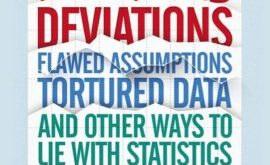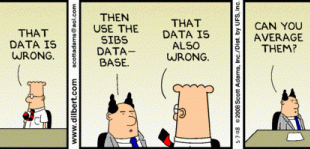[embedded content] Advertisements
Read More »Big Data Bullshit
[embedded content] Advertisements
Read More »Trickle-down baloney
[embedded content] Advertisements
Read More »An unconquerable soul
Great poem that helped Nelson Mandela keep hope alive during 27 years in prison. [embedded content] Advertisements
Read More »Nationalekonom varnar för bostadsbubbla
Nationalekonom varnar för bostadsbubbla En inte helt obekant ekonom uttalar sig här om situationen på dagens bomarknad. Advertisements
Read More »Texas sharpshooter fallacy
Data clusters are everywhere, even in random data. Someone who looks for an explanation will inevitably find one, but a theory that fits a data cluster is not persuasive evidence. The found explanation needs to make sense, and it needs to be tested with uncontaminated data. Similarly, someone who fires enough bullets at enough targets is bound to hit one. A researcher who tests hundreds of theories is bound to find evidence supporting at least one. Such evidence is...
Read More »Empirical economics and statistical power
Empirical economics and statistical power How credible is empirical economics? Is empirical economics adequately powered? Many suspect that statistical power is routinely low in empirical economics. However, to date, there has been no large-scale survey of statistical power widely across empirical economics. The main objectives of this article are to fill this gap, investigate the implications of low power on the magnitude of likely bias and recommend...
Read More »Economic history — a victim of economics imperialism
Economic history — a victim of economics imperialism Economic history was one of the first fields to succumb at least partially to so-called economics imperialism, the phenomenon through which the methods and models of economic theory have taken over other social scientific subject fields. The economic historian’s craft, which probably always tended to err in any case towards retrospective reassurance that things were never as bad as they appeared at the...
Read More »The DSGE quarrel
A recent paper by Christiano, Eichenbaum and Trabandt (C.E.T.) on Dynamic Stochastic General Equilibrium Models (DSGEs) has generated quite a reaction in the blogosphere … Bradford Delong points out that new Keynesian models were constructed to show that old Keynesian and old Monetarist policy conclusions were relatively robust, and not blown out of the water by rational expectations … The DSGE framework was then constructed so that new Keynesians could talk to RBCites. None...
Read More »Meta-analysis — nothing but an exercise in mega-silliness
Meta-analysis — nothing but an exercise in mega-silliness Including all relevant material – good, bad, and indifferent – in meta-analysis admits the subjective judgments that meta-analysis was designed to avoid. Several problems arise in meta-analysis: regressions are often non -linear; effects are often multivariate rather than univariate; coverage can be restricted; bad studies may be included; the data summarised may not be homogeneous; grouping...
Read More » Lars P. Syll
Lars P. Syll






